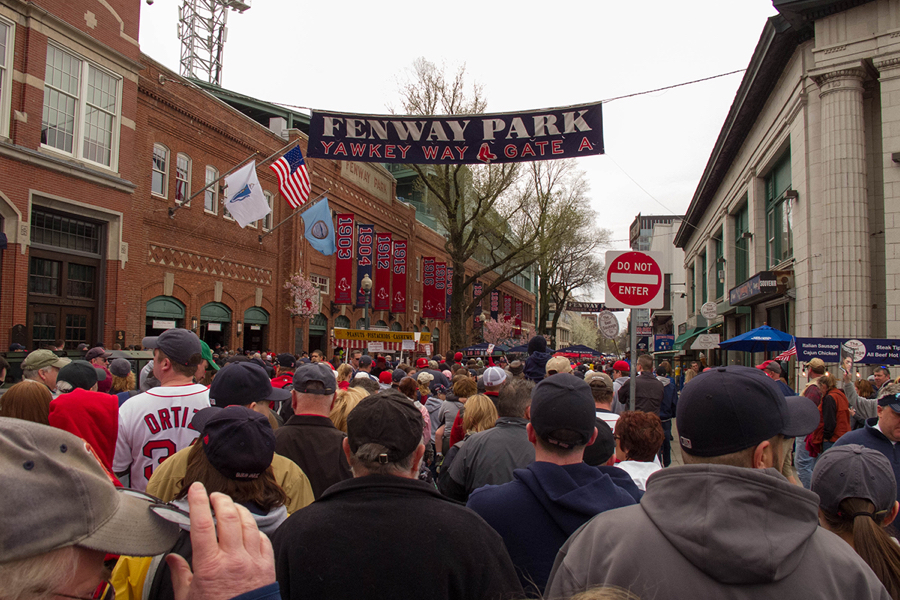Red Sox Owner John Henry Is Almost Rid of Yawkey Way
He officially asked the city to change the street's name.

photo by Photomaxmtl via Flickr/Creative Commons
Maybe you’ve got some fond memories of Yawkey Way: Crushing Fenway Franks and sausages, buying aggressively phrased bootleg T-shirts, celebrating among swarms of fans after big wins. But there has always been a big problem with the famous stretch that runs along the stadium: Tom Yawkey.
Until a few years ago, we weren’t really talking about the darker and more embarrassing aspects of his legacy. But times have changed. Controversial monuments are coming down in Massachusetts and elsewhere; the Boston Globe’s Adrian Walker has been beating this drum for two years (and the issue was also highlighted in the Globe’s big series on race last year); and current Sox owner John Henry has made it very clear he no longer wants his team to keep honoring Yawkey. As is widely known, Yawkey was the last owner to integrate his ball club, finally signing a black player in 1959—12 years after Jackie Robinson broke the color barrier. And Henry, whose team was ensnared in race-related controversy last year, says he is “haunted” by his predecessor’s legacy.
Now he’s making it official: On Wednesday, Henry formally asked the city to change the short thoroughfare’s name to “Jersey Street,” which it had been called until 1977. It’s time to exorcise Tom Yawkey’s ghost from Red Sox Nation once and for all, he says. “Restoring the Jersey Street name is intended to reinforce that Fenway Park is inclusive and welcoming to all,” the Sox said in a statement Wednesday. Henry, who also owns the Globe, previously considered renaming the street for David Ortiz, but that has apparently been shelved.
The change still needs approval from the Public Improvement Commission and the mayor, but consider it a done deal. All the other abutters to the street have signed on to the change, and although some fans are still attached to the street’s name, it feels like Boston is ready to see the “Yawkey” signs and banners come down.
There is another uncomfortable aspect to this, though: the Yawkey Foundation. Using cash from the Yawkey family, it’s an institution that has done non-controversial, undeniably good work in Boston and pumped millions into health care, education, and other areas. The Sox have taken pains to point this out. “It is important to separate the unfortunate and undeniable history of the Red Sox with regards to race and integration from the incredible charitable work the Yawkey Foundation has accomplished in this millennium and over the last 16 years,” the statement says. “The positive impact they have had, and continue to have, in hospitals, on education programs, and with underserved communities throughout Boston and New England, is admirable and enduring. We have the utmost respect for their mission, leadership, and the institutions they support.”
The foundation said Wednesday it is “deeply disappointed” by Henry’s attempts to ditch Yawkey Way. It has also challenged the way Yawkey has been scrutinized by modern critics, offered explanations for why the Sox remained all-white for so long, and said he wasn’t the racist he’s been made out to be.“Former Red Sox ballplayers and club officials who knew Tom Yawkey have stated many times that he treated every player the same, regardless of their race,” it said in a statement. “He also took an interest in their families and personal lives, and always gave them the support they needed, especially during difficult times. And he fielded diverse teams during the 1960s and 1970s, at a time when many of Boston’s institutions had yet to make meaningful progress in hiring minorities. The full picture of Tom Yawkey’s life is exactly the opposite of the one that Henry has tried to paint.”
The response from the Yawkey Foundation to the Red Sox plans to change the name of Yawkey Way. pic.twitter.com/boBRj81FSo
— Kirk & Callahan (@KirkAndCallahan) February 28, 2018

